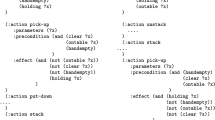Abstract
Some problem-solving tasks are amenable to integrated case retrieval and generative planning techniques. This is certainly true for some decision support tasks, in which a user controls the problem-solving process but cannot provide a complete domain theory. Unfortunately, existing integrations are either non-interactive or require a complete domain theory and/or complete world state to produce acceptable plans, preventing them from being easily used in these situations. We describe a novel integrated algorithm, named SiN, that is interactive and does not require a complete domain theory or complete world state. SiN users leverage a conversational case retriever to focus both partial world state acquisition and plan generation. We highlight the benefits of SiN (e.g., quadratically fewer cases needed) in an experimental study using a new travel planning domain.
Preview
Unable to display preview. Download preview PDF.
Similar content being viewed by others
References
Aha, D. W., & Breslow, L. A. (1997). Refining conversational case libraries. Proceedings of the Second International Conference on CBR (pp. 267–278). Providence, RI: Springer.
Avesani, P., Perini, A., & Ricci, F. (1998). The twofold integration of CBR in decision support systems. In D. W. Aha & J. J. Daniels (Eds.), Case-Based Reasoning dIntegrations: Papers from the 1998 Workshop Technical Report WS-98-15). Menlo Park, CA: AAAI Press.
Bergmann R., & Wilke W. (1995). Building and refining abstract planning cases by change of representation language. Journal of Artificial Intelligence Research, 3, 53–118.
Carrick, C., Yang, Q., Abi-Zeid, I., & Lamontagne, L. (1999). Activating CBR systems through autonomous information gathering. Proceedings of the Third International Conference on Case-Based Reasoning (pp. 74–88). Munich, Germany: Springer.
Golding, A., & Rosenbloom, P. S. (1991). Improving rule-based systems through case-based reasoning. In Proceedings of the Ninth National Conference on Artificial Intelligence (pp. 22–27). Anaheim, CA: AAAI Press.
Hammond, K. (1989). Case-based planning: Viewing planning as a memory task. Boston, MA: Academic Press.
Leake, D., Kinley, A., & Wilson, D. (1997). A Case Study of Case-Based CBR. Proceedings of the Second International Conference on Case-Based Reasoning (pp. 371–382). Providence, RI: Springer.
Mitchell, S. W. (1997). A hybrid architecture for real-time mixed-initiative planning and control. Proceedings of the Ninth Conference on Innovative Applications of AI (pp. 1032–1037). Providence, RI: AAAI Press.
Muñoz-Avila, H., McFarlane, D., Aha, D. W., Ballas, J., Breslow, L. A., & Nau, D. (1999). Using guidelines to constrain interactive case-based HTNplanning. Proceedings of the Third International Conference on Case-Based Reasoning (pp. 288–302). Munich, Germany: Springer.
Muñoz-Avila, H., Weberskirch, F., & Roth-Berghofer, T. (1997). On the relation between the context of a feature and the domain theory in case-based planning. Proceedings of the Second International Conference on Case-Based Reasoning (pp. 337–348). Providence, RI: Springer.
Nau, D., Cao, Y., Lotem, A., & Muñoz-Avila, H. (1999). SHOP: Simple hierarchical ordered planner. Proceedings of the Sixteenth International Joint Conference on Artificial Intelligence (pp. 968–973). Stockholm: AAAI Press.
Veloso, M. M., & Carbonell, J. G. (1993). Derivational analogy in PRODIGY: Automating case acquisition, storage, and utilization. Machine Learning, 10, 249–278.
Veloso, M., Mulvehill, A. M., & Cox, M. T. (1997). Rationale-supported mixed-initiative case-based planning. Proceedings of the Ninth Conference on Innovative Applications of Artificial Intelligence (pp. 1072–1077). Providence, RI: AAAI Press.
Weber, R., Aha, D. W., Muñoz-Avila, H., & Breslow, L. A. (2000). Active delivery for lessons learned systems. To appear in Fifth European Workshop on Case-Based Reasoning. Trento, Italy: Springer.
Wilkins, D. E. (1998). Using the SIPE-2 planning system: A manual for Version 5.0 (Working Document). Menlo Park, CA: Stanford Research International, Artificial Intelligence Center.
Author information
Authors and Affiliations
Editor information
Editors and Affiliations
Rights and permissions
Copyright information
© 2000 Springer-Verlag Berlin Heidelberg
About this paper
Cite this paper
Muñoz-Avila, H., Aha, D.W., Breslow, L.A., Nau, D.S., Weber, R. (2000). Integrating Conversational Case Retrieval with Generative Planning. In: Blanzieri, E., Portinale, L. (eds) Advances in Case-Based Reasoning. EWCBR 2000. Lecture Notes in Computer Science, vol 1898. Springer, Berlin, Heidelberg. https://doi.org/10.1007/3-540-44527-7_19
Download citation
DOI: https://doi.org/10.1007/3-540-44527-7_19
Published:
Publisher Name: Springer, Berlin, Heidelberg
Print ISBN: 978-3-540-67933-2
Online ISBN: 978-3-540-44527-2
eBook Packages: Springer Book Archive




